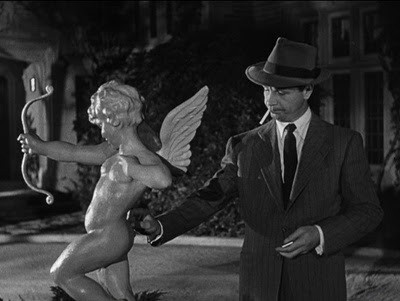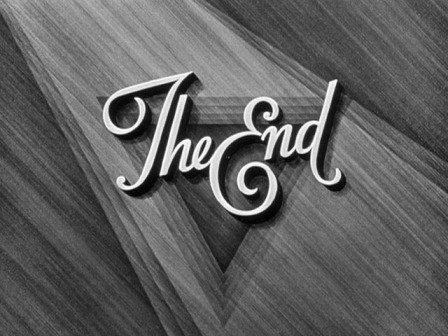 Director: Edward Dmytryk
Director: Edward Dmytryk
Screenplay: John Paxton
Based on a novel by: Raymond Chandler
Starring: Dick Powell, Claire Trevor, Anne Shirley
Producer: Adrian Scott
Country: USA
Running Time: 95 min
Year: 1944
BBFC Certificate: PG
Raymond Chandler’s famous private eye Philip Marlowe has been the subject of numerous film adaptations, the most celebrated of which is Howard Hawks’ The Big Sleep. Considered a masterpiece of the film noir genre, The Big Sleep is an enjoyable, sometimes brilliant piece of work but there is one element in particular that prevents me from including it on my list of all time greats: the plot. Chandler was known for his convoluted, perplexing plotlines and fans of The Big Sleep argue that the ins-and-outs of the story’s whodunnit matter little because Hawks shifts the focus away from the mystery and onto the detective. It’s true that the dialogue is fantastic, the chemistry between Humphrey Bogart (as Marlowe) and Lauren Bacall is palpable and the pacing is swift and energetic. However, I feel that critics have been too kind to The Big Sleep. The baffling, fumbled storytelling is a major flaw and, no matter how little some may claim it matters, it’s increasingly boring once everybody starts shooting each other and you have no idea why!
One of the problems with The Big Sleep‘s story is that it keeps piling on characters until it gets laughable. Every time you think you’re getting a handle on the plot, another new face turns up, bringing with them further twists and complications. The fact that most of the supporting cast isn’t half as memorable as Bogie or Bacall means they all start to blend into one and when the references to them by name start to enter the dialogue it’s nigh on impossible to remember who’s who. Two years before The Big Sleep came out however, there was an earlier adaptation of a Philip Marlowe mystery called Murder, My Sweet. Based on the Raymond Chandler novel Farewell, My Lovely (the film’s title was changed in America for fear audiences would take it for a mushy wartime musical), Murder, My Sweet starred former song and dance man Dick Powell as Marlowe. Though Powell was primarily known for musicals like 42nd Street and Footlight Parade, he made a move towards more serious roles as he approached his 40s. The part of Marlowe was a pivotal turning point in his career.
Given that the source material was the result of Chandler amalgamating three of his old short stories into a new whole, the prospect for Murder, My Sweet being any easier to follow than The Big Sleep seems unlikely. It would be a lie to say that Murder, My Sweet is totally coherent. You have to listen carefully to everything that is said and there’s the odd loose end here and there but, given that it’s based on a Chandler novel and in comparison with The Big Sleep, Murder, My Sweet is far less of a headache. John Paxton’s screenplay keeps the focus on a small set of characters who are all introduced fairly early on. There’s no need to worry about new characters turning up at the hour and a half mark and getting murdered before we even know what significance they have to the plot, if any! Like The Big Sleep, Murder, My Sweet does intertwine two seperate cases but it pulls them together logically and neatly.
The plot involves Marlowe being hired by a big gorilla of an ex-con named Moose who has just finished an eight year prison term and is trying to locate his old girlfriend. Another, seemingly unrelated case involving a jade necklace, a gold-digging femme and a seedy quack psychiatrist becomes mystifyingly entangled with this woman hunt, leaving Marlowe at a loss but determined to put the pieces of the puzzle together. The story is told in flashback as an injured Marlowe recounts the details to the police in an attempt to clear his own name. This plot device allows Dmytryk to retain the hardboiled, first person narration of Chandler’s work, the like of which became a much parodied mainstay of the detective genre.
While the description I’ve given of Murder, My Sweet thus far may suggest a dated, cliche ridden noir clunker, the film is actually notable for many brave choices and inventive touches. Not least of these is the casting of Powell as the lead. Known primarily as a boyish crooner, Powell could have been a disasterous choice but, in fact, he’s extremely good. He won the approval of Chandler himself and many critics have noted that Powell’s playful, schoolboy-esque take on Marlowe is far closer to the character as written than Bogart’s performance. Equally important to the appeal of the movie, and a key factor in making Powell a great choice for the lead, is John Paxton’s script which is unexpectedly hilarious. Critics of Murder, My Sweet often cite the fact that it’s too much like a light comedy but I think they got the balance just right. Amidst the murder and intrigue, we get wonderful narrations like “She was a charming middle aged lady with a face like a bucket of mud. I gave her a drink. She was a gal who’d take a drink, if she had to knock you down to get the bottle.” The Big Sleep was full of this witty dialogue too but we’d never have expected to see Bogart playing hopscotch on a tiled floor like Powell does. Paxton’s dialogue flows more naturally too, the zingers and put-downs sounding spontaneous despite their pre-packaged glisten.
There are several moments in the narrative when Marlowe is knocked unconcious, during which the screen is consumed by a drizzling black puddle. These sequences were quoted by the Coen Brothers in The Big Lebowski, in which The Dude (Jeff Bridges) is drugged and halucinates a porn film starring himself. Murder, My Sweet doesn’t quite go that far but one of these bouts of unconciousness does lead into a nightmarish dream sequence, in which the real mixes with the unreal as Marlowe attempts to escape a syringe-wielding doctor who can pass through doors. In an already inventive film, this sequence still comes as a surprise, adding a touch of the surreal to the heady mix.
Although it was a hit at the time, Murder, My Sweet was somewhat overshadowed by the latter day critical clamouring over The Big Sleep. A far superior film in my book, Murder, My Sweet is punchy, funny, intriguing, inventive and concise, ending after just 90 minutes. This means that the possible necessity for numerous viewings in order to put the plot together is not a daunting prospect and, if you’re anything like me, you’ll have been so charmed by the whole package that you’ll want to dive back in immediately to fill in the blanks. Dick Powell, then, is my favourite Marlowe and Murder, My Sweet my favourite take on his adventures. My second favourite Marlowe film would be Robert Altman’s contemporary 70s version, The Long Goodbye starring Elliot Gould. Despite it’s monumental reputation, The Big Sleep will have to put up with third place. My advice is if you want to see the wonderful Bogart in a great noir detective film, seek out The Maltese Falcon. If you want to see the best Philip Marlowe adaptation, go directly to Murder, My Sweet.












Ha, I was just thinking of asking if you’d seen Altman’s The Long Goodbye as I read your review then saw that you mentioned it at the end. I’m a big Raymond Chandler fan and I loved the 70’s take on his novel. I haven’t seen Farewell My Lovely yet, but it’s been on my radar for a while. I haven’t seen The Big Sleep in a long time, but I can remember liking it a lot when I was younger. I adore the book, although The Long Goodbye is possibly better as it’s got a bit more substance to it with regards to Marlowe’s character.